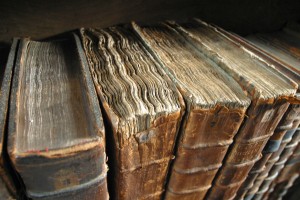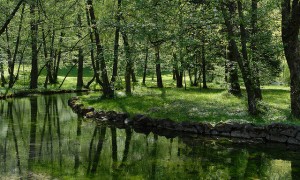Home

by Tom Murphy VII, used under CC BY
Throughout the 19th century, various genres of European literature existed. Some of the most prominent genres of European literature were:
- Science Fiction
- Romanticism
- Realism
- Naturalism
- Gothic
Science Fiction
During the 19th century there was a strong push for futuristic imagination within the British literature community. Space travels as well time travel were just two of the many different sub-categories of science fiction. This genre of literature provided a sense of the near future and is known as literature of ideas with multiple different philosophies coming from this specific genre. Imagination was all the start of science fiction, with many different ideas of future possibilities such as transportation, electricity, and telegraph. Notable authors writing within this genre include Mary Shelly’s Frankenstein, H.G. Well’s War of the Worlds, and also Jules Verne’s Voyages Extraordinaires. Later in the 19th century, science fiction evolved to a different genre of romantic science fiction, with many different authors turning their work towards a love story while incorporating science fiction and futuristic ideas.
Romanticism
Romanticism began during the eighteenth and nineteenth centuries after a revolt against Neoclassicism. It was a movement in art and literature. Romanticism focuses on the imagination, emotion, and freedom of an individual. Characteristics includes subjectivity and an emphasis on individualism. The movement triggered different emotions and different outlooks. In Wordsworth’s Lyrical Ballads, he defines poetry as “the spontaneous overflow of powerful feelings (Gutenberg.)” Romanticism became the experience where one could express themselves and become imaginative.
Some well-known figures during this time included:
- John Keats
- William Wordsworth
Realism
Realism is everything romanticism was not. The core of realism is exactly as it sounds, reality. Born in nineteenth-century France it aimed to depict everyday life and objective truth. The very matter-of-fact writing style of realism focuses on the characters and their circumstance as the plot development (Scheidenhelm, 2007).
One of the great examples of realism is War and Peace written by Leo Tolstoy.
We can know only that we know nothing. And that is the highest degree of human wisdom.
– Leo Tolstoy, War and Peace (1869)
In its search for the objective truth, realism is closely linked to naturalism. The main difference between the two forms of literature is the scientific focus in the latter.
Naturalism

by Photographer Wikimedia Commons, used under

Naturalism was a popular genre in 19th century European literature. According to Britannica Online Encyclopedia, naturalism can be defined as, “…a theory that relates scientific method to philosophy by affirming that all human beings and events in the universe are natural (Encyclopædia Britannica).” Methods such as the scientific method and other investigative practices were conducted to figure out supernatural causes of events. Naturalism was a literary movement that primarily sought out to answer questions such as:
- How is one’s human character shaped?
- Where did we as humans come from?
- How are things ought to be described?
One well-know European Naturalist was Charles Darwin.
His writings and observation tactics will be discussed into further detail in the “Naturalism” section on the site.
Here is a brief introductory video describing Naturalism:
https://www.youtube.com/watch?v=WT45xLgAZ4g
Gothic Literature
We all know it when we see it. That sense of gloom and foreboding, drawing us endlessly forward toward the heightened suspense of when the killer, monster, madman, etc. is revealed. That theme is what drew many readers in the 19th century towards the Gothic. To get to it’s height, Gothic Literature had to draw upon several genres and created many new ones. It takes romanticism and amplifies it, turns realism into sensationalism and invented the realm of science fiction.
*The references cited on the home page can be found on the genre of literature’s actual page
Morner, Kathleen and Ralph Rausch. NTC’s Dictionary of Literary Terms. Chicago: NTC Publishing Group, 1997.